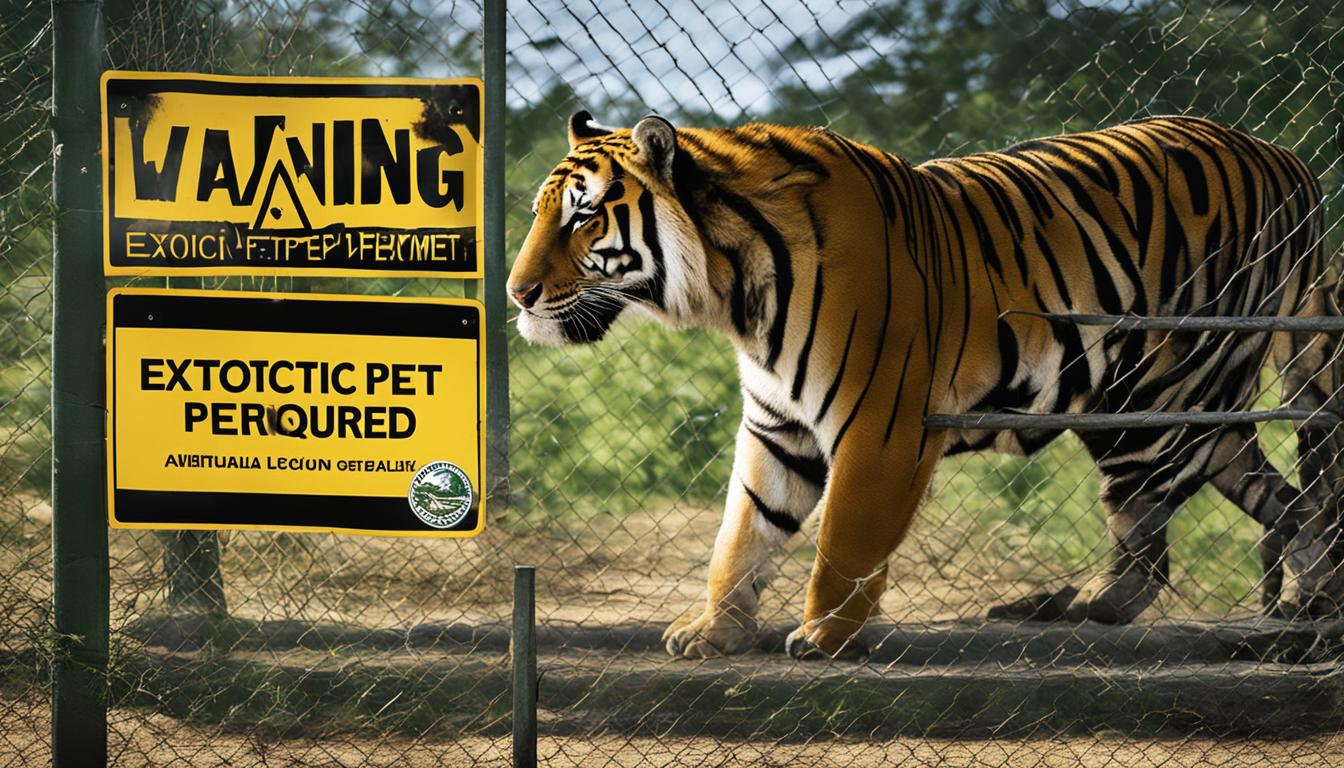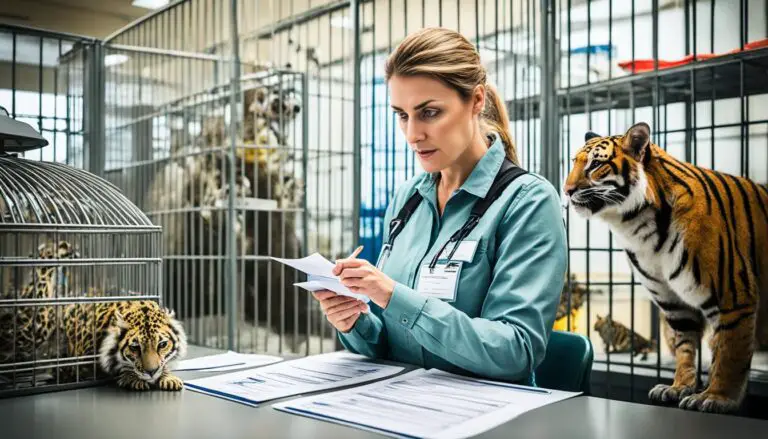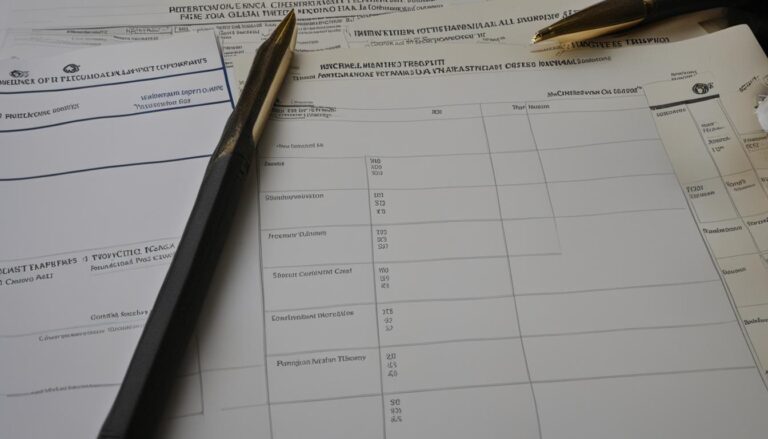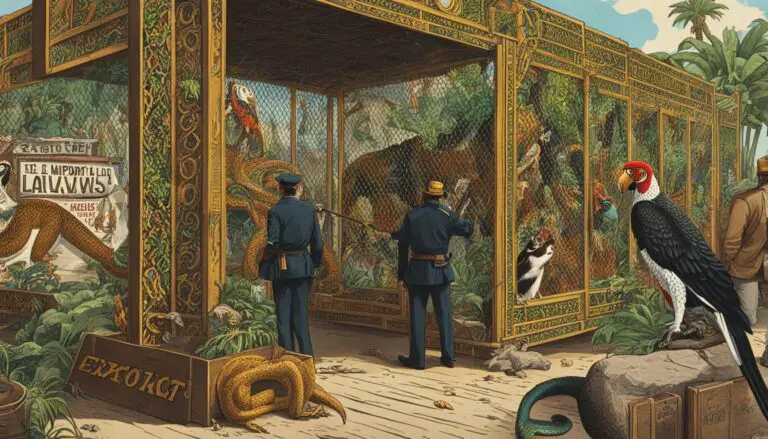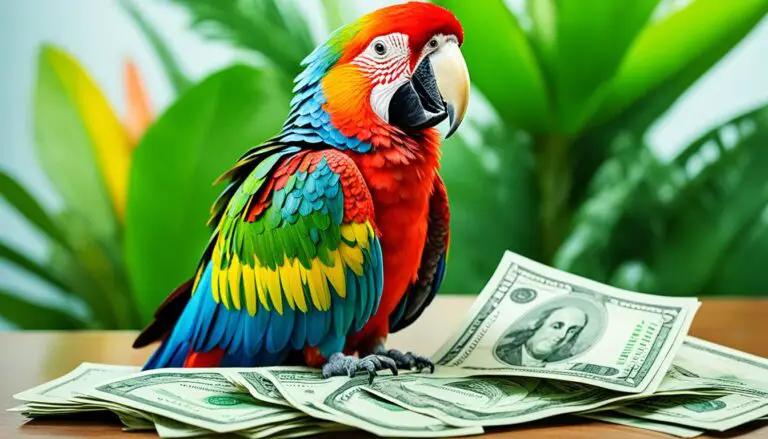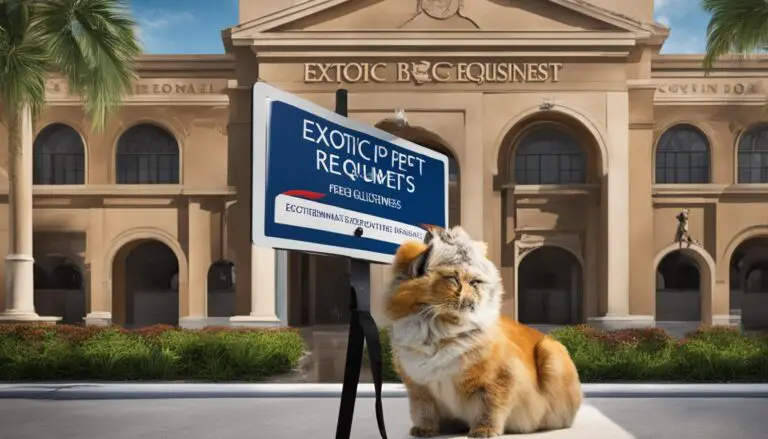Exotic Pet Permit Laws: Your Legal Guide
Welcome to our comprehensive guide on exotic pet permit laws. If you’re considering owning an exotic pet, it’s crucial to familiarize yourself with the legality of such ownership and the requirements involved. Understanding exotic pet permit laws ensures that you comply with the regulations and responsibilities that come with owning these unique creatures.
From state to state, there are varying regulations governing the ownership of exotic pets, and it’s essential to adhere to these laws to avoid legal complications. Whether you’re interested in owning a fox, skunk, opossum, bat, or any other unusual pet, this guide will provide you with the necessary information to navigate the permitting process and ensure that you are a responsible pet owner.
Key Takeaways:
- Exotic pet permit laws regulate the ownership of non-traditional pets.
- Understanding the requirements for owning an exotic pet is crucial to ensure legal compliance.
- Each state has its own laws and regulations regarding exotic pet ownership.
- Proper documentation and permits are necessary to legally own exotic pets.
- Complying with these laws safeguards the well-being of both the owner and the exotic pet.
Understanding Exotic Pet Permit Laws in the United States
When it comes to owning an exotic pet, it is essential to understand and comply with the exotic pet permit laws in the United States. These laws are in place to regulate the ownership and ensure the welfare of these unique animals. By familiarizing yourself with the laws and regulations, you can ensure the legality of your exotic pet ownership.
Defining Exotic Pets and Associated Regulations
Before delving into the specifics of the permit laws, it is crucial to define what qualifies as an exotic pet. Exotic pets are typically non-domesticated animals that are not commonly kept as pets. They can include reptiles, birds, mammals, and even certain insects. Each state may have its own definition and list of regulated exotic pets, so it is essential to research the specific regulations in your state.
Associated regulations for exotic pet ownership can include factors such as the requirements for cages and enclosures, veterinary care, transportation, and safety measures. These regulations are put in place to ensure the well-being of the animals and protect the public from potential risks associated with exotic pets.
The Importance of Complying with State Laws and Regulations
Complying with state laws and regulations regarding exotic pet ownership is crucial for several reasons. Firstly, it ensures that you are legally allowed to own and care for your exotic pet without facing legal consequences. Additionally, complying with these laws helps protect the welfare of the animals, as they often have specific requirements for their care and environment.
Moreover, by following the regulations, you contribute to the conservation efforts of these exotic species. Many exotic pet permit laws aim to prevent the illegal wildlife trade and promote responsible ownership practices. By adhering to these laws, you become an advocate for the well-being and preservation of these unique animals.
Understanding and abiding by exotic pet permit laws not only ensures your legal compliance but also demonstrates your commitment to responsible exotic pet ownership.
Now, let’s delve deeper into the legal implications and responsibilities associated with owning an exotic pet. But first, take a moment to visualize the diversity of exotic pets through the image below:
Exotic Pet Ownership: Legal Implications and Responsibilities
When it comes to owning an exotic pet, there are important legal implications and responsibilities that potential owners must be aware of. Before bringing a unique and fascinating creature into your home, it is crucial to understand the legal documentation, permits, and licenses required for ownership.
Obtaining the necessary legal documentation is a crucial step in owning an exotic pet. Depending on the jurisdiction, you may need to acquire permits or licenses that specifically allow you to own and care for exotic animals. These documents ensure that you are compliant with local laws and regulations, helping to protect both you and your pet.

Permits for owning exotic animals typically serve as a form of accountability and control. They help regulatory authorities keep track of the number and types of exotic animals being kept as pets, ensuring their welfare and proper care. By requiring permits, authorities can also evaluate the suitability of potential owners and provide education and support to promote responsible ownership.
Alongside legal documentation and permits, exotic pet owners have a range of responsibilities to fulfill. These responsibilities encompass providing proper care, handling, and containment for the exotic pet. Owners must ensure that their pets have access to appropriate food, shelter, veterinary care, and exercise. Additionally, they must take precautions to prevent escape or release into the wild, as exotic pets can have a significant impact on native ecosystems and wildlife populations.
Owning an exotic pet is a privilege that comes with important legal obligations. By complying with the necessary documentation and permits, as well as fulfilling your responsibilities as a pet owner, you can create a safe and fulfilling environment for both yourself and your unique companion.
Steps to Obtain an Exotic Pet Permit
Obtaining an exotic pet permit is a crucial step in legally owning and caring for an exotic pet. This section will guide you through the process, ensuring you have all the information you need to navigate the permit application successfully.
Initial Research and Preparing the Application
Before applying for an exotic pet permit, it’s essential to conduct thorough research. Start by identifying the specific permit requirements for the exotic pet you wish to own. Different species may have different regulations and guidelines, so it’s crucial to have a clear understanding of what is required.
Once you have gathered the necessary information, it’s time to prepare the application. Make sure to fill out all the required forms accurately and completely. Double-check that you have included all supporting documentation, such as proof of identity, residency, and any additional permits or licenses that may be necessary. Take the time to carefully review your application, ensuring everything is in order before submission.
Navigating the Paperwork: Essential Documentation
When applying for an exotic pet permit, there are several essential documents you will need to submit. Here are some commonly required documents that you should be prepared to provide:
- Proof of identification (such as a driver’s license or passport)
- Proof of residency (such as a utility bill or lease agreement)
- Documentation proving your ability to meet the unique needs of the exotic pet, such as previous experience or professional qualifications
- Adequate insurance coverage (if required by local regulations)
- A detailed description of the proposed living conditions and enclosure for the exotic pet
- Any additional permits or licenses that may be necessary, depending on the species
It’s important to consult the specific permit application guidelines provided by your local authorities to ensure you are submitting all the required documentation.
By following these steps and thoroughly preparing your application with all the necessary documentation, you can increase your chances of obtaining an exotic pet permit. Remember to always comply with the requirements set by local regulations to ensure the health, safety, and well-being of both the exotic pet and the surrounding community.
Exotic Animal Licensing: Agencies to Contact
Obtaining an exotic animal license is an essential step in legally owning and caring for exotic pets. To navigate the licensing process smoothly, it’s important to reach out to the relevant agencies that handle exotic pet permits. These agencies can provide you with the necessary information and guidance to ensure compliance with exotic animal licensing regulations.
When seeking an exotic pet permit, it is recommended to contact the following agencies:
- State Department of Fish and Wildlife: This agency oversees the regulation and permitting of exotic animals within the state. They can provide detailed information on permit requirements, application processes, and any specific restrictions or regulations in place.
- State Department of Agriculture: In some cases, the Department of Agriculture may be involved in the permitting process for exotic pets, especially those that are considered agricultural animals. Contact the department to inquire about any additional permits or requirements specific to your chosen exotic pet.
- Local Animal Control Agency: Your local animal control agency may also have information about the exotic pet permit process. They can provide guidance on local laws and regulations, as well as any specific requirements or restrictions within your city or county.
Be sure to reach out to these agencies early in your planning process to gather all necessary information and ensure a smooth application for your exotic pet permit. Remember to ask about any fees associated with the permit application, as well as any ongoing responsibilities or inspections required to maintain compliance.
By engaging with the appropriate agencies, you can proactively address any concerns or questions you may have and ensure that you meet all legal requirements for owning an exotic pet.
In addition, you should also explore resources provided by reputable organizations such as the Association of Zoos and Aquariums and local exotic animal sanctuaries. These organizations can offer valuable guidance and support as you navigate the licensing process and embark on a responsible exotic pet ownership journey.

Species-Specific Permit Requirements in Pennsylvania
In Pennsylvania, owning certain exotic pets requires species-specific permits. It is important to understand the legal requirements for owning these animals to ensure compliance with Pennsylvania’s exotic pet permit laws. This section will provide detailed information on the permit requirements for owning foxes, skunks, opossums, and bats in the state.
Legal Requirements for Fox Species and Permitting Process
If you are interested in owning a fox species as an exotic pet in Pennsylvania, it is necessary to obtain a species-specific permit. The permitting process involves several steps to ensure the responsible ownership and care of these animals.
To legally own a fox species in Pennsylvania, individuals must:
- Submit a completed permit application to the appropriate regulatory agency.
- Provide documentation that proves compliance with the necessary requirements, such as proper enclosures, sufficient space, and knowledge of fox care.
- Pay the required fees associated with the permit application.
By following these steps and meeting the legal requirements, individuals can obtain the necessary permit to own a fox species in Pennsylvania.
Navigating the Legal Landscape for Owning Skunks, Opossums, and Bats
In addition to foxes, the ownership of skunks, opossums, and bats in Pennsylvania also requires specific permits. These native species have unique permit requirements that aim to protect both the animals and the public.
To legally own skunks, opossums, or bats in Pennsylvania, individuals must:
- Apply for a species-specific permit from the applicable regulatory agency.
- Provide documentation demonstrating the necessary knowledge and experience to care for these animals.
- Ensure the proper housing and containment of these species to prevent escapes and safeguard public safety.
By fulfilling these requirements and obtaining the appropriate permits, individuals can legally own skunks, opossums, and bats in Pennsylvania.
It is essential to understand and abide by the species-specific permit requirements in Pennsylvania when considering ownership of these exotic pets. By following the legal guidelines, owners can ensure the well-being of the animals and prevent any legal repercussions.
Prohibited Exotic Animals in Pennsylvania: Understanding the Restrictions
When it comes to owning exotic pets in Pennsylvania, there are strict laws and regulations in place to protect both the animals and the public. It is essential to understand the prohibited exotic animals and the specific restrictions associated with their ownership.
Under Pennsylvania law, certain species are prohibited as pets due to their potential to pose a threat to human health and safety or the environment. These restrictions are in place to prevent harm and maintain the balance of local ecosystems.
If you are considering owning an exotic pet in Pennsylvania, it is crucial to familiarize yourself with the specific animals that are prohibited. Some examples of prohibited exotic animals include:
- Lions, tigers, and other big cats
- Bears
- Primates
- Crocodiles and alligators
- Venomous snakes
Owning these animals without the appropriate permits and licenses is illegal and can result in fines, confiscation of the animal, and even criminal charges. It is essential to abide by these restrictions to ensure the well-being of both the animals and the community.
If you are unsure about the legality of owning a particular species as a pet in Pennsylvania, it is advisable to contact the Pennsylvania Game Commission or consult with an experienced exotic pet attorney who can provide guidance and clarification.

Understanding and respecting the restrictions on exotic pet ownership is crucial for maintaining the safety and welfare of both animals and humans. By adhering to these laws, we can contribute to the responsible and ethical care of exotic animals while also preserving the natural environment.
The Role of the Pennsylvania Game Commission in Exotic Pet Permits
In Pennsylvania, the Pennsylvania Game Commission plays a crucial role in regulating and overseeing exotic pet permits. The commission is responsible for ensuring the safety and welfare of both exotic animals and the general public.
One of the primary functions of the Pennsylvania Game Commission is to enforce the state’s laws and regulations regarding the ownership and possession of exotic pets. They work diligently to prevent the illegal importation and release of exotic species that could potentially harm the local ecosystem.
The commission also provides valuable services and support through their Special Permits Enforcement Division. This division is dedicated to assisting individuals who wish to obtain permits for owning exotic animals. They guide applicants through the complex process of acquiring the necessary legal documentation, permits, and licenses.
Through the Special Permits Enforcement Division, the Pennsylvania Game Commission offers resources and education to exotic pet owners. They provide valuable information on the proper care, handling, and containment of exotic animals. This ensures that exotic pet owners are well-informed and equipped to meet the specific needs of their pets.
Services and Support Offered by the Special Permits Enforcement Division
The Special Permits Enforcement Division of the Pennsylvania Game Commission offers a range of services and support to individuals seeking exotic pet permits. Some of the key services provided include:
- Guidance on the permit application process
- Assistance in obtaining the necessary legal documentation
- Educational resources and materials on exotic pet ownership
- Regular inspections to ensure compliance with permit requirements
- Investigation of potential violations and enforcement of exotic pet laws
Exotic pet owners can rely on the expertise and dedication of the Special Permits Enforcement Division to navigate the legal landscape of owning exotic animals responsibly. The division works closely with individuals to ensure they meet all the requirements and regulations, promoting the welfare of both the animals and the community.
Peculiar Pets: Cases of Legal Exotic Animals Without Permit Needs
While ownership of many exotic animals requires special permits, there are some fascinating cases where individuals can legally keep these unique creatures without the need for permits. These extraordinary pets offer a glimpse into the diverse world of exotic animals that fall outside the realm of traditional permit requirements.
One such example is the Crested Gecko. Known for its vibrant colors and charismatic appearance, this nocturnal lizard is a popular choice among pet enthusiasts. With their docile nature and low maintenance requirements, Crested Geckos have become legal pets without the need for permits in many regions.
Another charming creature that can be legally owned without permits is the Sugar Glider. These small, gliding marsupials have captured the hearts of many animal lovers. They require special care and an appropriate environment, but they offer a truly unique pet ownership experience.
“These creatures add a touch of wonder to our lives. The joy of interacting with such peculiar pets cannot be overstated,” says Dr. Sarah Thompson, an exotic pet veterinarian.
The elegant Axolotl is yet another exotic creature that does not require permits for ownership. These aquatic salamanders have captivated pet enthusiasts with their regenerative abilities and striking appearance. Keeping Axolotls as pets provides individuals with an opportunity to observe and appreciate these incredible amphibians.
These examples represent just a glimpse into the world of legal exotic pets without permit needs. Each case offers a unique opportunity for pet enthusiasts to indulge in the wonders of the animal kingdom while adhering to legal requirements.
| Exotic Animal | Description |
|---|---|
| Crested Gecko | A nocturnal lizard known for its vibrant colors and docile nature. |
| Sugar Glider | A small, gliding marsupial that requires special care and an appropriate environment. |
| Axolotl | An aquatic salamander with regenerative abilities and a striking appearance. |
These extraordinary pets serve as a reminder of the incredible diversity found in the world of exotic animals. While permits may be necessary for many exotic pet ownerships, these cases highlight the intriguing opportunities available to pet lovers without the need for permits.
Conclusion
In conclusion, understanding and complying with exotic pet permit laws is essential for anyone considering owning an exotic pet. These laws exist to protect both the animals themselves and the communities in which they reside. By following the legal requirements and obtaining the necessary permits, exotic pet owners can ensure the safety and well-being of their pets while also maintaining the integrity of their community.
It is crucial for exotic pet owners to understand their responsibilities and be accountable for their actions. Owning an exotic pet comes with unique challenges and duties, including providing proper care, handling, and containment. By fulfilling these obligations, exotic pet owners can contribute to the overall welfare and conservation of these fascinating and often vulnerable species.
Additionally, individuals who are passionate about exotic animals can make a difference by supporting animal sanctuaries and conservation efforts. By volunteering their time, making donations, or spreading awareness, they can help protect and preserve the habitats and well-being of exotic animals. Together, we can create a world where both exotic pets and their natural counterparts can thrive.
Source Links
- https://www.animallaw.info/statute/pa-exotic-pets-subchapter-d-permits-relating-wildlife-chapter-147-special-permits-subchapter
- https://philly.citycast.fm/explainers/exotic-pets-allowed-in-pennsylvania
- https://exoticpetwonderland.org/2024/01/19/what-exotic-pets-are-legal-in-pennsylvania/
Peter Stones is the founder of Exotic Pets Place, the leading online resource for exotic pet care information.
With over 10 years of hands-on exotic pet ownership experience, he is deeply passionate about sharing his expertise to help others properly care for their unusual pets.
When he's not writing extensively researched articles or connecting with fellow exotic pet enthusiasts worldwide, you can find Peter at home tending to his own beloved menagerie of exotic animals.

